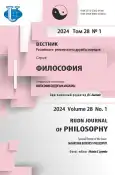Mahayana Philosophy: Problems and Research
- Autores: Lysenko V.G.1
-
Afiliações:
- Institute of Philosophy of Russian Academy of Sciences
- Edição: Volume 28, Nº 1 (2024): MAHAYANA BUDDHIST PHILOSOPHY
- Páginas: 7-18
- Seção: MAHAYANA BUDDHIST PHILOSOPHY
- URL: https://journal-vniispk.ru/2313-2302/article/view/325441
- DOI: https://doi.org/10.22363/2313-2302-2024-28-1-7-18
- EDN: https://elibrary.ru/DCIKWT
- ID: 325441
Citar
Texto integral
Resumo
The introduction to the topic of this issue is an overview of the research articles authored by Russian, Lithuanian, and Indian scholars on various problems of Mahayana Buddhist philosophy. While explaining the status of the terms “Mahāyāna” and “Hīnayāna,” the author emphasizes that since they are represent the apologetic conceptualizations of Mahayanists, the appellation “Hīnayāna” (“Lesser Vehicle”, etc.) is not recognized either by those Buddhists who are supposed to be characterized by it, or by scholars striving for a neutral appellation. This creates difficulties, including the need for a generally accepted designation for this Buddhist tradition. However, despite the apologetic nature of the Mahāyāna - Hīnayāna opposition, the difference between the two is captured very plausibly. The first one teaches about the individual way of achieving liberation from the cycle of endless rebirths (saṃsāra) through a personal, individual self-perfection (the path of the arhat) leading to enlightenment (bodhi) and nirvāṇa (extinction of passions). The second one develops a full-fledged religion with its own pantheon and rituals, in which nirvāṇa and individual liberation, while remaining, more or less theoretically, the ultimate goal, are pushed to a distant plane. At the same time, the idea of compassion and the ideal of bodhisattva who, having taken a vow to help all living beings to get rid of sufferings, continues to remain in saṃsāra, is put forward in the center. However, despite this major difference a Buddhist discipline known as Abhidharma which consists in analysis and classification of discrete states of consciousness (dharmas), identified in meditation, remains a reference point in both traditions. Three authors touch upon it (Helen Ostrovskaya, Pradeep Gokhale, and Vladimir Korobov). Two of them (Ostrovskaya and Gokhale) focus on the problems of murder and death, and the third one (Korobov) dwells on the methodology of Abhidharma. Vladimir Ivanov offers a new interpretation of the structure of Śāntarakṣita’s treatise “Tattva-saṃgraha” with Kamalaśīla’s “Pañjikā” commentary. Yangutov and Lepekhov explore the specificity of Buddhism reception in China, Tibet, Mongolia, and Russia. Nesterkin publishes for the first time B. Baradiin’s theses for Agvan Dordjiev’s lecture, which exemplifies the Buryat Buddhist Renovationists’ interpretation of Buddhism. Burmistrov analyzes the views of Indian historians of philosophy on the history of Buddhism, Volkova - the concepts of Buddhist ethics in contemporary analytical philosophy.
Palavras-chave
Sobre autores
Victoria Lysenko
Institute of Philosophy of Russian Academy of Sciences
Autor responsável pela correspondência
Email: vglyssenko@yandex.ru
ORCID ID: 0000-0002-6069-3502
DSc in Philisophy, Chief Researcher, Head of the Oriental Philosophy Sector
bd. 1, 12 Goncharnaya St., 109240, Moscow, Russian FederationBibliografia
- Lysenko VG. Abhidharma. In: Philosophy of Buddhism. Encyclopedia. Stepanyants MT, editor. Moscow: Oriental Literature RAS; 2011. P. 62—66. (In Russian).
- Shokhin VK. Abhidharma texts. In: Philosophy of Buddhism. Encyclopedia. Stepanyants MT, editor. Moscow: Oriental Literature RAS; 2011. P. 69—75. (In Russian).
- Lysenko VG. Dharmas. In: Philosophy of Buddhism. Encyclopedia. Stepanyants MT, editor. Moscow: Oriental Literature RAS; 2011. P. 317—320. (In Russian).
- Shokhin VK. Dharma. In: Philosophy of Buddhism. Encyclopedia. Stepanyants MT, editor. Moscow: Oriental Literature RAS; 2011. P. 308—309. (In Russian).
- Kritzer R. Vasubandhu and the Yogācārabhūmi: Yogācāra Elements in the Abhidharmakośabhāṣya. International Institute for Buddhist Studies of the International College for Postgraduate Buddhist Studies, 2005.
- Lysenko VG. Karma. In: Philosophy of Buddhism. Encyclopedia. Stepanyants MT, editor. Moscow: Oriental Literature RAS; 2011. P. 360—369. (In Russian).
- Lysenko VG. Saddha. In: Philosophy of Buddhism. Encyclopedia. Stepanyants MT, editor. Moscow: Oriental Literature RAS; 2011. P. 577—578. (In Russian).
- Lysenko VG. Pratītyasamutpāda. In: Philosophy of Buddhism. Encyclopedia. Stepanyants MT, editor. Moscow: Oriental Literature RAS; 2011. P. 549—554. (In Russian).
- Lysenko VG. Hetu and pratyaya. In: Philosophy of Buddhism. Encyclopedia. Stepanyants MT, editor. Moscow: Oriental Literature RAS; 2011. P. 735—739. (In Russian).
Arquivos suplementares









